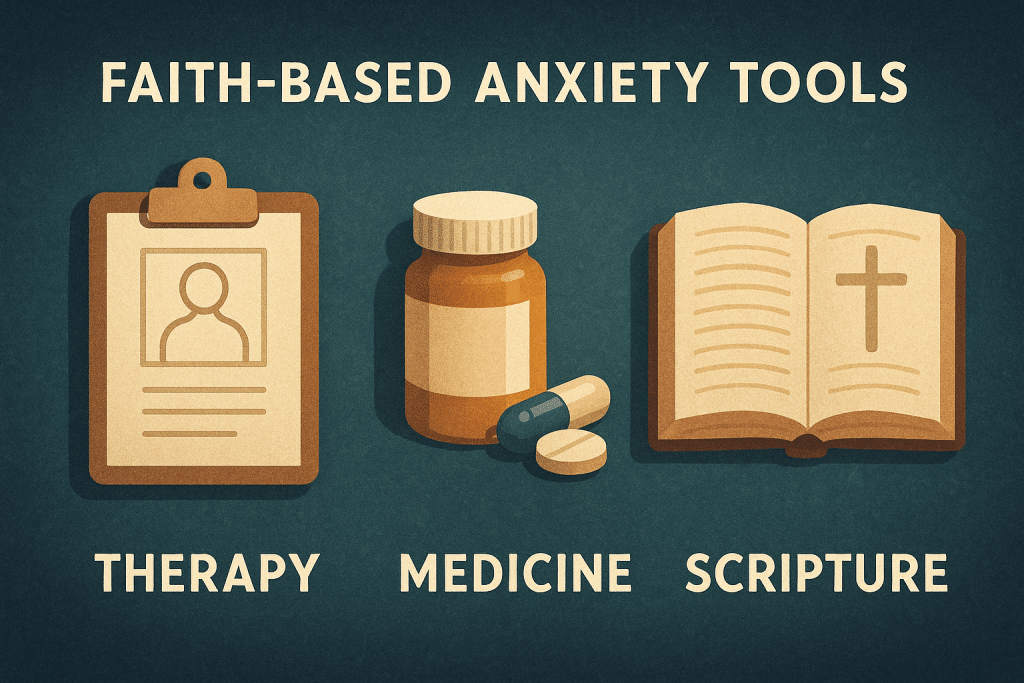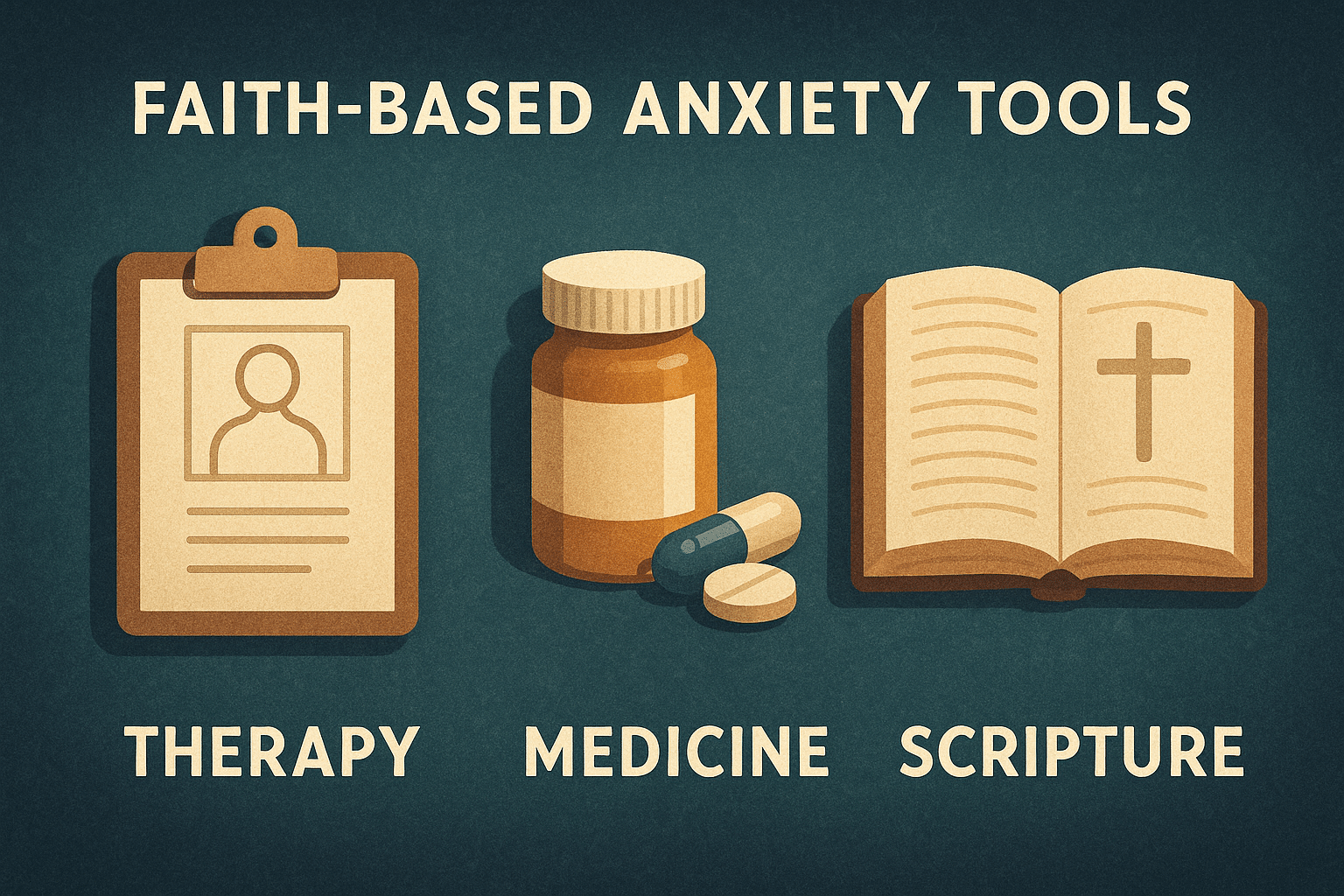Christian Tools For Managing Anxiety — Faith & Science
Estimated reading time: 7 minutes
Introduction
Anxiety touches many faithful people, and it often feels like a storm that will not pass. However, you can draw on Christian wisdom and science together to calm your body and renew your mind. To make that journey simpler, this guide organizes practical steps as christian tools for managing anxiety you can start today. Moreover, it draws on global research and Scripture so you receive help that is compassionate, factual, and hopeful.
As context, the World Health Organization reports that anxiety disorders affect hundreds of millions worldwide, yet effective treatments exist. Additionally, the National Institute of Mental Health notes that anxiety remains common in the United States and responds well to care. Consequently, believers do not need to white‑knuckle fear alone; they can seek God’s peace and use evidence‑based care without shame. Furthermore, internal resources like prayer, fellowship, and wise thinking work best when paired with simple, repeatable habits.
Finally, this article keeps the language practical and kind so you can apply each idea right away. Therefore, you will see step‑by‑step rhythms, links for deeper learning, and real‑world examples. Above all, you will find encouragement to involve your church family and, when appropriate, your clinician.

Why anxiety feels physical and spiritual
First, anxiety is not only a feeling; it is a full‑body response designed to keep you safe. When your brain senses threat, your heart rate rises, your muscles tense, and your thoughts race. Therefore, it helps to learn how the fight‑or‑flight system works and how to activate the body’s rest‑and‑digest response. Additionally, slow breathing, a brief prayer, or a grounding exercise can flip that internal switch toward calm. For step‑by‑step help, see our guide to deep breathing exercises and these grounding techniques for anxiety.
For Christians, this physiology and faith connection makes sense. After all, Scripture invites us to be still before God and to cast our cares on Him. Consequently, a short breath prayer such as “Lord, You are with me” on the inhale and “I trust You” on the exhale can settle the body while it centers the heart. Moreover, practicing the same words daily trains your nervous system to associate God’s presence with safety. To go deeper, read our anxiety biblical guidance overview.
Likewise, gentle movement and light exposure during the day can improve sleep at night, which then reduces next‑day worry. Similarly, limiting late‑afternoon caffeine prevents jitters that mimic panic. Altogether, small changes create space for peace to grow. If Scripture helps you settle, bookmark these Bible verses for anxiety and return to them whenever fear surges.
Biblical anxiety tools that work
To renew your mind, begin with Scripture meditation and honest prayer. For instance, read a short passage, underline a promise, and repeat it out loud for one minute. Then, write a two‑sentence prayer that names your fear and invites God’s help. Consequently, the practice anchors attention and replaces rumination with truth. When you want a specific passage, Philippians 4:6–7 offers a clear next step; review it on BibleGateway, and try our prayer for anxiety guide.
Next, use a gratitude list to shift perspective. As you record three gifts each day, you teach the brain to notice safety and goodness. Moreover, add one act of praise such as singing a hymn or thanking God for specific care. As a result, you will build a habit that competes with worry and improves mood. Notably, the Anxiety & Depression Association of America explains how gratitude practices reduce stress and anxiety; explore their primer here.
Finally, share your burdens with trusted believers. Because anxiety isolates, it loses strength when you ask for prayer and wise perspective. Therefore, consider a small group or a pastoral counselor who understands both the Bible and mental health. In addition, you can invite a friend to text you when you try a new step so you celebrate progress together. If social fear holds you back, our social anxiety guide blends faith and science to help you practice courage.
Christian strategies for anxiety: therapy and medicine
Evidence‑based counseling such as cognitive behavioral therapy helps believers challenge catastrophic thinking and practice brave actions. Furthermore, many Christians integrate CBT with Scripture by reframing a fearful thought using a verse that speaks to the same issue. For example, a thought like “I must control everything” can become “I will do my part and trust God with tomorrow.” Therefore, therapy aligns naturally with the call to renew the mind. For an accessible overview, see this UC Davis Health explainer on anxiety treatment here.
Additionally, some people benefit from medication under a clinician’s guidance. SSRIs can reduce baseline anxiety and create room for learning new skills, while short‑term medicines may help during acute spikes. However, medicines are not substitutes for discipleship or coping skills, so a combined plan usually works best. Consequently, Christians can view treatment as a wise use of God’s common grace. If you wrestle with stigma, note that Christian clinicians also defend appropriate medication use; review this pastoral FAQ from Focus on the Family.
Importantly, always discuss risks, benefits, and alternatives with your doctor, and never change a prescription without medical advice. Likewise, schedule time for rest, movement, and nourishing meals while you engage therapy. In the same way, stay connected to your church so support remains steady. When you want a single place to start, return to these Christian tools for anxiety and build one small rhythm today.

Daily rhythm: simple habits that lower anxious arousal
Begin with a morning reset. After a glass of water, read a few verses, breathe deeply for two minutes, and walk outside for light exposure. Then, write a small, specific goal for the day. Therefore, you signal safety to your nervous system before the inbox opens. If panic occasionally spikes, try the brief steps in our panic attack relief guide and practice them when calm so they feel familiar.
During the day, use micro‑breaks. For example, set a reminder to stand, roll your shoulders, and pray a ten‑second prayer every ninety minutes. Additionally, eat regular meals and keep caffeine modest. As a result, the afternoon slump eases and you maintain steady energy. When worry loops persist, pause to read a verse on trust at Bible verses for anxiety and then restart your task.
Toward evening, downshift. Moreover, reduce blue‑light exposure, journal concerns you will revisit tomorrow, and practice progressive muscle relaxation. Finally, end with a brief examen: where did you notice God’s care today and where do you need it tonight? Consequently, you fall asleep faster and wake with more peace. If trauma memories intensify stress, consider these steps to calm your nervous system after trauma.
Faith‑based anxiety tools: practical products that complement your plan
Thoughtful tools can support these habits. Below are options many readers use alongside christian tools for managing anxiety, church support, and professional care. Always consult a clinician regarding medical conditions or supplements. Additionally, every link uses our Amazon affiliate tag to support continued free resources.
- Journaling Bible — A wide‑margin Bible makes meditation and note‑taking simple, which strengthens recall and focus.
- Guided Prayer Journal — Prompted pages help you name worries, track gratitude, and record answered prayer each week.
- Weighted Blanket — Gentle pressure can reduce arousal for some people and may improve sleep onset.
- White Noise Machine — Consistent sound masks nighttime noises and supports a calming pre‑sleep routine.
- Verse Memory Cards — Carry key promises to rehearse truth when worry spikes away from home.
Conclusion: Christian anxiety management with steady hope and practice
In summary, you can combine spiritual formation and clinical wisdom to find steadier peace. When you practice these christian tools for managing anxiety each day, your brain learns safety while your heart remembers God’s care. Therefore, keep the steps small, repeatable, and connected to supportive people.
Meanwhile, celebrate every small win. Because consistency matters more than intensity, progress often looks ordinary before it feels dramatic. Finally, ask the Holy Spirit to guide your decisions and to fill your mind with what is true, noble, and praiseworthy. When you need more structure, review our guide to slowing down and our notes on theology of embodiment and anxiety.







